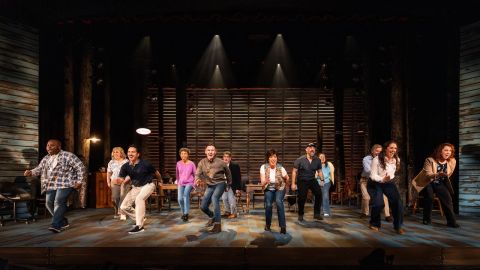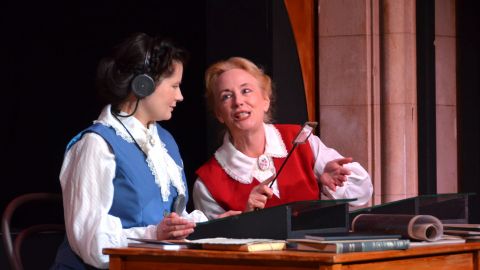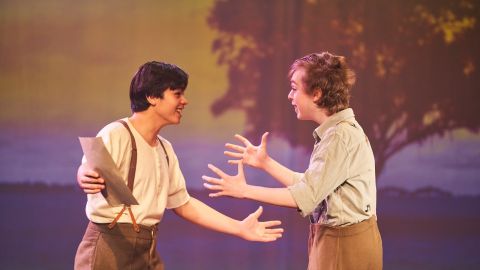Queensland Theatre Creatives Talk Season 2022

After QT's launch on 26 September, Beth Keehn spoke to some of the creatives involved in the upcoming 2022 season.
Queensland's Rich Pool of Creative Talent
Looking at the personnel who will be bringing QT's 2022 season to life, I was struck by the vitality of the team that will work together to present the 2022 season. This reflects the lively arts scene in Brisbane and Queensland that many may have appreciated afresh in 2021. These arts practitioners are multi-taskers who have certainly not spent 2021 in the wings, waiting for the phone to ring. For example, Director Daniel Evans is one of QT's Associate Artists. An award-winning writer, director and producer, he has worked internationally and across Australia with many theatre companies as a playwright and director, as well as a producer for TV. He is also a founding member of The Good Room performance collective.
Writer Hannah Belanszky and Director Isaac Drandic
Another QT Associate Artist, based in Cairns, Isaac Drandic is an actor, director and dramaturg who specialises in new First Nations work. Previous productions include Meyne Wyatt's City of Gold and he has just started working with Brisbane-based writer Hannah Belanszky, who has been honing her play Don’t Ask What the Bird Look Like since she was a finalist in the Queensland Premier’s Drama Award in 2018–19.
I spoke to Hannah for Stage Whispers in May 2018 when the play was called Cup of Tea; it has been through various iterations since then, along with that crucial name change.

Beth Keehn (BK): Hannah, what has been your writing process since 2018?
Hannah Belanszky (HB): I had a little break from the play and just let it sit. I worked with Kylie Bracknell on another commissioned draft of the script. I went over to Perth for the Fringe Festival and I worked on the draft, and then we had a reading at the end of 2019, and picked up work on it again at the end of 2020. It's great hearing new voices speaking it and getting Isaac more involved.
BK: When did you come on board, Isaac?
Isaac Drandic (ID): It must have been 2020 - about this time last year. I was up in Cairns and I came to Brisbane on my way to do another play in Hobart and we did a workshop and introduced ourselves.
HB: We kind of cracked it open again. Alot has happened since then for me, so we got back into it again. We did a development in Cairns earlier this year. Sadly lockdown hit when we got there as well. I flew up to Cairns and we did a day workshop – it was the best day – and then there was a lockdown in both Brisbane and Cairns! So, I had a Zoom meeting with Roxanne McDonald from the hotel in Cairns – she was in a room across the road! We did a day on Zoom.
BK: Is Roxanne going to be in the show?
ID/HB: We don't know yet.
BK: She should just be in every show.
ID: I know, she belongs on stage, any stage, doesn't she?
BK: Hannah, will you be involved in the casting?
HB: I don't know.
ID: We had a conversation this morning... I think I work a little bit differently from other directors. Generally I think it's important for the story that the writer's involved. Having those conversations is really important to me. I may be the key realiser of the work, but I'm not the story source. For example, I worked with Nathan Maynard and Jamie McCaskill (on Hide the Dog) and Meyne Wyatt (on City of Gold). These guys are closely connected to their story, and bring another level of knowing what's good for the work that supersedes a director. My approach is to try and guide it as much as possible, but at some stage let it go.

BK: What else are you working on?
HB: I have another play I've been working on that I started on in 2019 with the Playlab and QPAC's Sparks programme for First Nations writers. This year I received a grant to do more development on that script. We've had a reading and I've been alternating between drafts of the new play and this one for QT.
BK: What are you most looking forward to about this production for QT in 2022?
HB: Letting it go and seeing what it is. I'm really excited to see the other creatives coming on board and putting their response and what they bring out of it, and what the work ends up being that is beyond me as well. I'm excited to see what that is.
ID: I'm looking forward to the process. That's always the most exciting part for me – how we take an idea and how it grows and becomes a living breathing thing on stage – it's a mystery!
HB: For me, the play has been this file on my computer, and it's been in my life for nearly five years. So I'm excited for it to be out there and be brought to life and not just words on a page.
Writer/Director Wesley Enoch
Wesley Enoch was previously Artistic Director of QT from 2010 to 2015. He was awarded the Member of the Order of Australia in 2020 for his service to the performing arts as an Indigenous playwright and director. He has recently relocated to Brisbane after five years with the Sydney Festival. His final season was an all-Australian content festival and he commissioned around 40 new Aussie works. He is also busy as Queensland University of Technology's (QUT's) inaugural Indigenous Chair in the Creative Industries (appointed in March 2021). His play, Seven Stages of Grieving (which Wesley wrote with Deborah Mailman) is also part of Grin and Tonic's 2022 season.

BK: We all know that there is a wealth of talent in Queensland. Everyone has so many creative things going on. Wesley, you have just completed five years with the Sydney Festival and you also work at QUT.
Wesley Enoch (WE): Reviving this show is an opportunity to look back, but also to get back into directing. I realise I haven't directed as much as I'd like to over the past few years while running the Sydney Festival.
BK: What's it like being back in Brisbane?
WE: It's good: it's home. Because I'm living on Stradbroke Island which is where my family come from, there's real sense of homecoming, and focusing on things that are important for me. Just thinking of the next 10 years and what the next big project might be that I want to do. I don't know yet what that will be – but I'm a great believer in taking some time out and thinking about it.
Turning to work that you've done before – like The Sunshine Club – I mean, I was 29 when I wrote that piece, so you start to think 'Who is that 29-year-old? And what does my current self think about that 29-year-old? And what lessons have I learnt in the intervening years? And what can I bring to the work now as a director, as a writer? So, I'm interested in looking at the script and what it has to say about today. As Lee Lewis has said about her choice of this play for the 2022 season, and I think she is right – why would you go back to a play –what's it about? I think it's about storytelling around dancing together, about being together and not to feel frightened about that – and as we talk about treaties and sovereignty, the next evolution of our relationship with First Nations Australians – this is a moment to say 'It's a very long history, it's not a short one and there are lots of role models in our history that we can go back to and look at.
For me, I look at the Uluru Statement – the Statement from the Heart, an incredibly beautiful document that talks about sharing this country. This particular play is like that as well –sharing the dancefloor, sharing it as a place to be together.
BK: There's a history there that many people won't know about.
WE: And, even our theatrical history can be short and often forgotten. For example, The Sunshine Club has not been published – the only way it lives on is in the stories we tell. And this might be an opportunity to get it printed, let's put it in place.

BK: Apart from your work, has anything else been inspirational in helping your get through the last 18 months?
WE: I've been in this dialogue between my introvert and my extrovert. And that's been really interesting, realising that, as my introvert that's the place I write from, and where I do proper analysis; and my extrovert is the great communicator and the one who is always outward-facing – so I think trying to find the balance has been really useful. Let's say over the last 10 years, from when I was running QT and then Sydney Festival, people value the extrovert in our industry – and I need to value the introvert a little bit more – so on Stradbroke Island I'm just doing the gardening, reading and putting things into perspective. I'm working hard but finding my own way of doing things, which is good.
BK: So we might see a new play from you in the next couple of years?
WE: That's the great dream. I've got a couple of ideas to work on, but I need to physically get started, so I need to get my act together!
BK: What are you most looking forward to about the revival of The Sunshine Club?
WE: This opportunity to revisit and talk to the 29-year-old me and say 'We've come this far now, let's take this work there'. And it's a new opportunity to offer these roles to a new generation of performers. When we cast The Sunshine Club the first time, we had the cream of the crop and they were just starting their careers. 20 years on, they are the creme de la creme, leading the industry: Wayne Blair, Elaine Crombie, Roxanne McDonald, David Page, Stephen Page and Ursula Yovich. This is an opportunity to talent spot the next generation.
Writer/Director Jason Klarwein
As well as writing and directing for Brisbane's Grin and Tonic Theatre Troupe and overseeing their touring programme to schools throughout Queensland as Artistic Director, Jason Klarwein has also served on the MEAA Board as federal president of Equity until mid-2021. For Grin and Tonic, he has adapted and abridged several Shakespeare's plays, including Macbeth, Romeo and Juliet, and Hamlet which are all part of Grin and Tonic's 2022 season. For QT, he adapted Othello with Jimi Bani as a tri-lingual (Kala Lagaw Ya, Yumpla To and English) piece.

BK: Jason, you must have been very very busy over the last 18 months! As well as working on Othello for QT, you are involved in Grin and Tonic's 2022 season which features Shakespeare as well. Why Shakespeare?
Jason Klarwein (JK): Well, I'm addicted to it! And that's because there is an ownership in language. When you first come into contact with Shakespeare, it's something that you can find impenetrable. It can be a wall of language or text that you just have to deal with. But actually, when you look into it, it's not as complicated or sophisticated as you thought. And I think ownership of language brings empowerment.
As an example, as well as being a Chief of Wadagadum, Jimi Bani's grandfather, Efrem Bani Jr, was a linguist. He went to Canada to study to be a linguist and he came back and codified some of the Kala Lagaw Ya language with his own way of spelling to match the natural way that people speak the language, instead of the missionary spelling. There's a Super 8 film of him, filmed by Jimi's grandma, and Efrem's in the picture and he's breaking down a whole song, called The Chart. The Chart is a piece of Torres Strait Islander literature about geography, meteorology, agriculture, and what it tells you is where to go at a certain time of year, read clouds and do certain things. But the way that it's put together is so poetic and rich and highly structured – it reminds me of the way that Shakespeare structures his plays.
To me there is an equivalency in really deep language – and that was one of the things that Jimi and I got really excited about. I told Jimi that some of this Shakespeare has been taught to me by people before me and the people before them and so on. And really, actors pass down that knowledge and various tricks of the trade that you deal with in a Shakespeare play.
There is something about Shakespeare, when you speak it – and if it's spoken well – people stop. It's like Beethoven – you hear it and go 'Oh, what is that?' It's written for actors – it has to be performed and he writes character like no one else. He writes character so well, that we don't even know who Shakespeare is! That's how good it is. Who Shakespeare was doesn't really matter because, in the end it's about a legacy of a whole group of actors who published the First Folio (published after Shakespeare's death). Those actors came together to compile the plays because they were so popular and out of respect for the writer. But I'm sure those actors would have written half of their lines.

BK: Definitely an actor – not some Earl of Oxford sitting in a library somewhere.
JK: I think that theory abounds because people just can't believe that someone in the working class could have written such a body of work.
BK: Apart from Othello, what have you been working on in 2021?
JK: I've been developing another show with Jimi Bani. This is a children's theatre piece about the Speckled Flying Fox from Far North Queensland, which is an endangered species. The Italian designers who we've been working with on Othello have drawn up a storyboard as a start for making the children's show. Jimi's 9-year-old daughter will be in the play with actor Mark Sheppard. We've got a bit more development to go, but that show has live animation and puppetry. Grin and Tonic's school shows tour around. And I'm currently at the University of Southern Queensland directing Martin McDonagh's The Lieutenant of Inishmore with their third-year graduates. I love working with their students because they are regional kids and they are just so nice. I'm having a great time.
BK: What is the thing you are looking forward to most in 2022?
JK: You know what I'm really looking forward to? It's seeing 12 Queensland actors on this stage here at Bille Brown Theatre.
Images by Beth Keehn (Stage Whispers shots) and Justin Ma.
Read more about the Queensland Theatre 2022 Season
https://www.stagewhispers.com.au/news/queensland-theatre-qt-season-2022-launch-0





